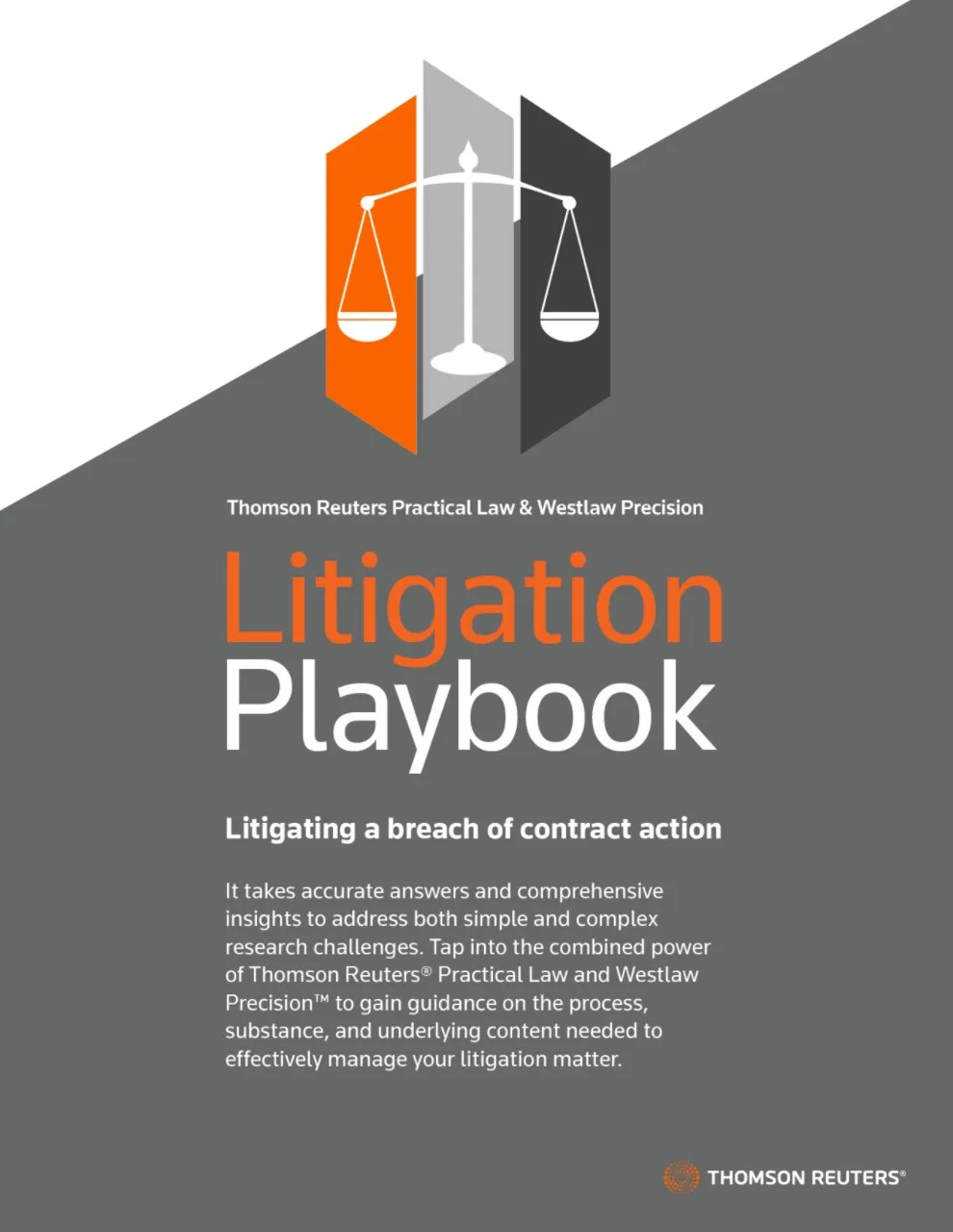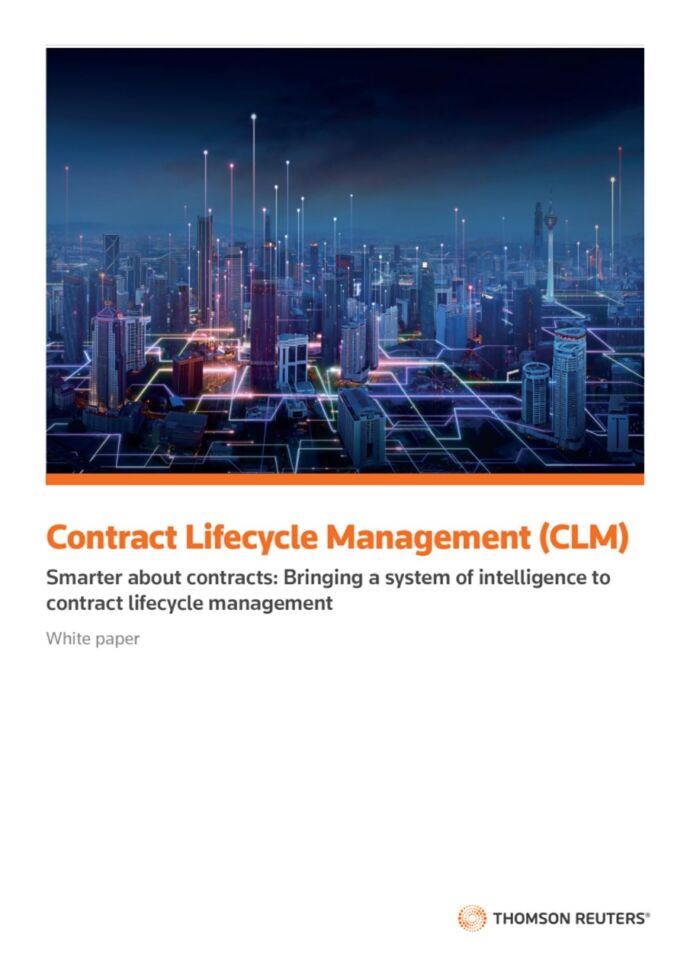Why contract lifecycle management systems are becoming increasingly popular and how they can help legal departments
As contracts become more complex and multi-jurisdictional, legal departments need to make contract drafting and approval scalable and replicable. A contract lifecycle management (CLM) system may be a solution busy departments with growing workloads need.
Jump to ↓

Playbook
Litigating a breach of contract action: The answers you need and how to proceed when litigating a matter.
Download free playbook ↗The growing use of CLM
Here’s what the growing workload and response has looked like in recent years:
- 44% of corporate legal departments were using CLM systems in 2018.
- 55% of corporate legal departments were using CLM systems in 2021.
Adding to the pressure, 65% of corporate legal departments saw matter volumes increase in 2022, often with no corresponding increase in budget. When legal departments calculate the ROI of legal software, the discussion should include a review of the costs as well as the benefits. Although the cost of contract lifecycle management can vary widely, there is little doubt that CLM tools can increase a legal department’s ability to work efficiently and effectively to boost morale, job satisfaction, and overall results.
What is CLM
Contract lifecycle management is a tech-based, end-to-end solution for handling, tracking, and automating the creation, negotiation, execution, and monitoring of contracts managed by a legal department. CLM complements lawyers’ expertise and controls all aspects of the contract management process in one central repository—a single source of truth that adds value to corporate legal departments.

Content Packet
Subscriber resources from the legal industry's most trusted how-to service
Access content ↗AI-enabled CLM for businesses
Legal departments are moving from using CLM solutions to simply track and store contracts to using them to assist and automate workflows. They deploy AI to evaluate contracts, leverage data, and analyze risk to drive business decisions. AI-enabled CLM helps legal departments gain real-time insights into the contracts they are managing by:
- Establishing automated workflows to uncover the essential elements of a contract
- Speeding up document review by searching entire portfolios
- Streamlining manual, time-consuming processes
- Providing businesses with greater visibility into their overall contract workflow
- Enabling legal teams to transform from cost center to value driver
Is your corporate law department taking a manual approach to contract lifecycle management? If so, you are likely reinventing the wheel on routine tasks and scrambling to provide insight to the business to support important strategic decisions. Instead, consider equipping your team with intelligent CRM—an investment that helps you bring strategic insight to critical business decisions, allows your team to be more responsive to business needs, and frees up lawyers’ time for higher-value work.
A best-in-class AI-enabled CLM allows businesses to gain greater understanding into their contractual obligations, which allows them to:
- Accomplish more with less effort. When contracts aren’t in a consistent format, it can take days of manual effort to identify all of the company’s responsibilities to vendors, customers, and other outside parties. Without a streamlined view of all your obligations to third parties, you’ll waste valuable time and resources.
- Close deals faster. An AI-enabled CLM system offers real-time visibility and automated features that make finding documents across all stages of the lifecycle quick and easy. This helps the legal team work more collaboratively and responsively with colleagues and gives parties on all sides—the lawyers, the business, and the customer—an advantage in negotiations.
- Facilitate data analysis. A well-designed CLM solution provides legal departments with a “system of intelligence,” which means using the CLM to analyze clauses and other elements of the contract to identify risk areas and help the business take preventative action.
- Automate processes and workflows. The lifecycle of a contract involves numerous stakeholders, particularly when it comes to approval and execution. CLM systems with automated workflow tools enable you to build approval and signing protocols, as well as escalation procedures, directly into the contracting process.
- Securely manage and search for documents. A contract management system must provide secure storage of all contracts in one place, with powerful search capability to help businesses find what they need when they need it. Even better, AI-enabled CLM can track all document activity, access, downloads, and revisions, with redline generation tools to see changes made over the contract’s lifecycle.
- Inject efficiency into the contracting process. Collaboration is essential to timely contract execution. After all, many internal and external stakeholders—in-house counsel, outside counsel, interested business units, and counterparties—will want to share thoughts and suggestions in comments, annotations, and tasks, and redline changes before finalizing the document for signature. A contract management platform fosters seamless collaboration to help ensure that the team is always working on the latest version of a document.
Greater value and accuracy
When an organization implements an AI-powered CLM solution, it allows senior executives to come together in a centralized contract management ecosystem where they have control and visibility into all contracting activities, workflows, approvals, documents, and metrics —speeding up transactions and delivering greater value to the business while improving accuracy and lowering risk.
Are you ready to find out more about how a CLM can boost your law department’s contract management efficiency? Check out Thomsen Reuters’ white paper, “Smarter About Contracts,” today.

White Paper
Smarter about Contracts: Bringing a system of intelligence to contract lifecycle management
Access white paper ↗








